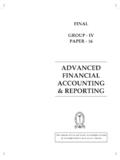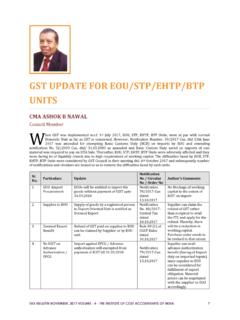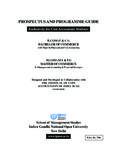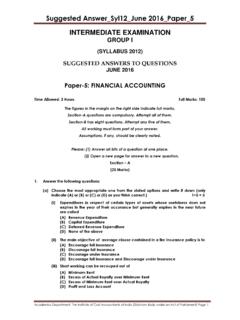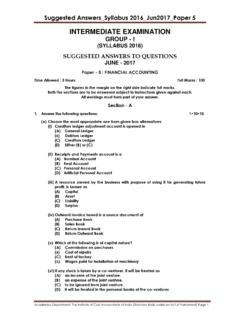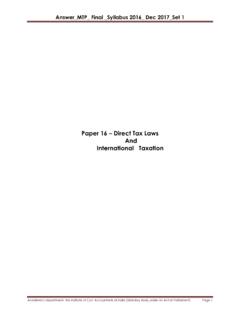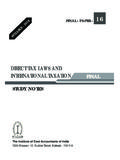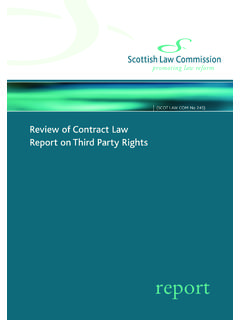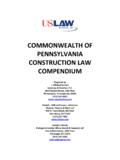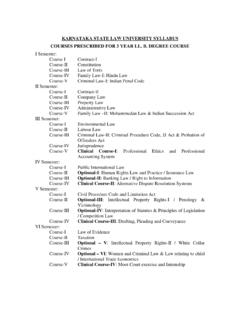Transcription of Published By - icmai.in
1 First Edition : March 2018 Published By : Directorate of Studies The Institute of Cost Accountants of India CMA Bhawan, 12, Sudder Street, Kolkata 700 016 Copyright of these study notes is reserved by the Institute of Cost Accountants of India and prior permission from the Institute is necessary for reproduction of the whole or any part thereof. Work Book Directorate of Studies, The Institute of Cost Accountants of India (Statutory Body under an Act of Parliament) LAWS & ETHICS INTERMEDIATE GROUP I PAPER 6 INDEX Sl. No. Section A : Commercial Laws Page No. 1 Indian contract Act, 1872 1 12 2 Sale of Goods Act, 1930 13 20 3 Negotiable Instruments Act, 1881 21 26 4 Indian Partnership Act, 1932 27 28 5 Limited Liability Partnership Act, 2008 29 31 Section B : Industrial Laws 6 Factories Act, 1948 32 35 7 Payment of Gratuity Act, 1972 36 39 8 Employees Provident Fund and Miscellaneous Provisions Act, 1952 40 41 9 Employees State Insurance Act, 1948 42 44 10 Payment of Bonus Act, 1965 45 46 11 Minimum Wages Act, 1948 47 49 12 Payment of Wages Act, 1936 50 51 Section C : Corporate Law 13 Companies Act, 2013 52 68 Section D : Ethics 14 Business Ethics 69 78 Work Book : Laws & Ethics Directorate of Studies, The Institute of Cost Accountants of India (Statutory Body under an Act of Parliament) Page 1 Study Note 1 INDIAN contract ACT, 1872 A.
2 Fill in the blanks: 1. The breach of contract may be _____ (a) Actual (b) Anticipatory (c) none of the above (d) either of the above 2. Section _____ of Indian contract Act, 1872 define 'proposal'. (a) 2(a) (b) 2(b) (c) 2(d) (d) 2(e) 3. Section 2(j) of the Indian contract Act, 1872 defined _____ (a) valid contract (b) void contract (c) voidable contract (d) quasi contract 4. The person to whom the proposal is made is called the _____ (a) offerer (b) offeree (c) proposer (d) promisor 5. Consideration can be classified into ____ types. (a) four (b) five (c) six (d) three 6. An agreement with a party who is not competent to contract is _____ (a) void (b) voidable (c) valid (d) illegal 7. Contingent contract is defined in section ____ of Indian contract Act (a) 30 (b) 31 (c) 32 (d) 34 8.
3 Pledge is a special kind of _____ (a) bailment (b) Rule (c) business (d) product 9. A proposal when accepted becomes a _____ and an agreement enforceable by law is ____. (A) agreement, acceptance (B) promise, contract (C) contract , promise (D) acceptance, consideration 10. An agreement which prevents a person from carrying a lawful business is _____ under____ of the Indian contract Act, 1872. (A) void/section 27 (B) voidable/section 28 (C) illegal/section 26 (D) valid/section 10 11. Which of the following statements is true _____ (A) contract =agreement+ enforceability at law (B) agreement = offer+ acceptance (C) both (D) none of the above Work Book : Laws & Ethics Directorate of Studies, The Institute of Cost Accountants of India (Statutory Body under an Act of Parliament) Page 2 12.
4 A and B entered into an agreement for the share of profit, among them, which is to be acquired by them by fraud. It is not a valid argument because _____ (A) Its object is unlawful (B) its considerations is unlawful (C) its offer is unlawful (D) it is an exceptional agreement 13. Contracts classified on the basis of performance are _____ (A) Executed contract (B) executory contracts (C) partly executed or partly executory contracts (D) all of the above. 14. Mistake of Fact can be two types _____ (A) Own and foreign (B) Unilateral & Bilateral (C) Unilateral & Foreign (D) Own and bilateral 15. Section 68 to ____ the Indian contract Act describes the cases which are deemed____ contracts. (A) 72, Quasi (B) 73, Contingent (C) 74, Invalid (D) 75, Void 16.
5 Quantum Meruit means _____ (A) as much as earned (B) as much as performed (C) as much as found (D) as much as worked 17. The bailment of ____ as security for payment of a debt or performance of a promise is called _____. (A) goods, pledge (B) rule, void (C) product, services (D) services, void 18. Barun went into a restaurant and took a cup of tea. In this case, there is _____ (A) No contract by Barun to pay for the cup of tea (B) An implied contract that he will pay for the cup of the tea (C) An express contract to pay for the cup of the tea (D) A quasi contract to pay for the cup of tea Answer: Question No 1 2 3 4 5 6 7 8 9 10 11 12 13 14 15 16 17 18 Answer D A B B D A B A B A A A D B A A A B B. Answer the following questions: 1. State the essential elements of a valid contract . Answer: The following are the requirements for a valid contract - There shall be an offer or proposal by one party and acceptance of the proposal by the other party which results in an agreement; There shall be an intention to create legal relations or an intent to legal consequences; Work Book : Laws & Ethics Directorate of Studies, The Institute of Cost Accountants of India (Statutory Body under an Act of Parliament) Page 3 The agreement shall be supported by lawful consideration; The parties to the contract shall be capable of contract ; There shall be genuine consent between the parties to the contract ; The object and consideration of the contract shall be legal and the same shall not be opposed to public policy; The terms of the consent shall be certain.
6 The agreement is capable of being performed , it is not impossible of being performed. 2. What is an Offer? What are the points to be considered for a valid offer? Answer: The term proposal is otherwise called as offer . An offer is a proposal by one person, whereby he expresses his willingness to enter into a contractual obligation in return for promise, act or forbearance. Section 2(a) of the Act defines proposal or offer as when one person signifies to another his willingness to do or abstain from doing anything with a view to obtaining the assent of that other to such act or abstinence, he is said to make a proposal or offer. The person making the proposal is called as offeror or proposer and the person the proposal is made is called as offeree . The offer must be a valid one.
7 The following points are to be taken into account for a valid offer- The offer must be in clear, definite, complete and final terms. It should not be vague in terms; The offer must be communicated to the offeree. The offer becomes effective only when it has been communicated to the offeree so as to give him an opportunity to accept or reject the offer; The communication may be in writing or oral; The communication may be in expressed terms or in implied terms; The offer may be general or specific if an offer is made to a specific person it is called specific offer. Such offer can be accepted by such specific person; if an offer is made to the world at large, it is a general offer. It can be accepted by any member of the general public by fulfilling the condition laid down in the offer; Communication of offer is complete when it comes to the knowledge of the person to whom it is made.
8 An offer which has been communicated properly continues as such until it lapses or revoked by the offeror or rejected or accepted by the offeree. 3. What is Consideration? What are the different types of consideration? State the Legal Rules Regarding Consideration. Answer: Section 2(d) of the Act defines the term consideration which has been discussed in the early part of this material. Consideration is essential for every contract . The following are the fundamental principles for consideration- Consideration must be at the desire of the promisor; Consideration may move from the promise or any other person; Work Book : Laws & Ethics Directorate of Studies, The Institute of Cost Accountants of India (Statutory Body under an Act of Parliament) Page 4 Types of consideration Consideration may be of the following types- Executory or future it means it makes the form of promise to be performed in the future; Example A makes an engagement with B to marry her in future.
9 Executed or present it is an act or forbearance made or suffered for a promise. Past it means a past act or forbearance, that is to say, an act constituting consideration took place and is complete before the promise is made. Legal Rules Regarding Consideration: 1. It must move at the desire of the promisor 2. It may move from the promisee or any other person 3. Consideration must be something of value. 4. It may be an act, abstinence or forbearance or a return promise 5. It may be past, present or future which the promisor is already not bound to do. 6. It must not be unlawful. 7. Consideration need not be adequate 8. It must not be illusory 9. It must not be opposed to public policy 10. Pre-existing obligations 4. Explain the general rule ex-nudopacto non oritur action . Answer: The general rule is ex-nudopacto non oritur action an agreement made without consideration is void.
10 For example; if A promises to pay B ` 1000 without any obligation from B. This is a void agreement for want of consideration. However, the Act itself provides exceptions to this rule in section 25 itself. As per section 25, an agreement made without consideration is not void in the following circumstances: 1. Promise made on account of natural love and affection. 2. Promise to compensate for voluntary services. 3. Promise made to pay a time barred debt. 4. Gift actually made: 5. Creation of agency: 6. Charitable subscription 5. Writes short notes on [a] stranger to contract / doctrine of privity of contract [b] Lapse of offer Work Book : Laws & Ethics Directorate of Studies, The Institute of Cost Accountants of India (Statutory Body under an Act of Parliament) Page 5 Answer: [a] stranger to contract / doctrine of privity of contract : The doctrine of privityof contract means that a contract is between the parties only and no third person can sue upon it.
